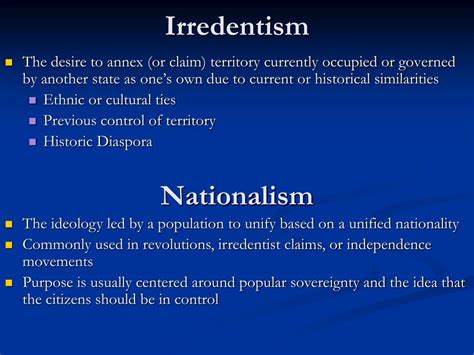Definition
Irredentism is a political ideology that seeks to reclaim lost territories and unify people of the same ethnicity or culture. It manifests as a desire for territorial expansion, typically based on historical or cultural claims.

Historical Context
Irredentism has been a driving force behind numerous conflicts and territorial disputes throughout history. Some notable examples include:
- Italy’s claims to Trieste and the Trentino region after World War I
- Germany’s Anschluss with Austria in 1938
- India’s absorption of Hyderabad in 1948
- Israel’s occupation of the West Bank and Gaza Strip after the Six-Day War in 1967
Contemporary Examples
In recent years, irredentist movements have resurfaced in several regions:
- Catalonia in Spain: The Catalan independence movement seeks to separate the region from Spain and form a separate state.
- Kurdistan in Turkey, Syria, Iraq, and Iran: Kurdish nationalists advocate for the creation of an independent Kurdistan, uniting Kurdish populations scattered across multiple countries.
- Transnistria in Moldova: The breakaway region of Transnistria has declared independence from Moldova and seeks to join Russia.
- Nagorno-Karabakh in Azerbaijan: The conflict over this disputed territory between Azerbaijan and Armenia has resulted in two wars and ongoing tensions.
Causes
Irredentism arises from various factors, including:
- Historical Grievances: Claims based on perceived historical injustices or territorial losses.
- Ethnic and Cultural Affinity: A sense of belonging to a larger ethnic or cultural group, often accompanied by a desire for unification.
- Nationalism: Strong feelings of national pride and a desire to expand or regain territories perceived as rightfully belonging to the nation.
- Political Opportunism: Leaders may exploit irredentist sentiments to gain electoral support or bolster their political power.
Consequences
Irredentism can have significant consequences, both positive and negative:
Positive Consequences:
- Territorial Expansion and Unification: Successful irredentist movements can lead to the expansion of a nation’s borders and the unification of its people.
- Increased National Pride: Reclaiming lost territories can boost national morale and foster a sense of unity.
Negative Consequences:
- Conflict and War: Irredentism can lead to conflicts with neighboring states or within a country’s own population, resulting in human suffering and instability.
- Economic Burden: Absorbing new territories can strain resources and place a financial burden on the nation.
- Social Unrest: Irredentism can promote intolerance and discrimination against minority groups within the newly acquired territories.
Solutions
To mitigate the negative consequences of irredentism, various approaches can be considered:
- Diplomacy and Negotiation: Diplomatic efforts and negotiations can help resolve territorial disputes and reduce tensions between nations.
- Economic Cooperation: Cross-border economic initiatives can foster interdependence and reduce the appeal of irredentism.
- Power-Sharing Arrangements: In cases of ethnic or cultural diversity, power-sharing arrangements can provide autonomy and protect the rights of minorities within a nation.
- International Law and Security: International organizations and peacekeeping forces can play a role in enforcing agreements and preventing conflicts related to irredentism.
Conclusion
Irredentism remains a potent force in international politics, with the potential to ignite conflicts and shape the geopolitical landscape. Understanding its causes and consequences is crucial for managing territorial disputes and promoting stability. By adopting diplomatic solutions, encouraging economic cooperation, and fostering inclusive societies, nations can mitigate the negative consequences of irredentism and create a more just and peaceful world.
Additional Information
Common Mistakes to Avoid
When discussing irredentism, avoid the following common mistakes:
- Confusing Irredentism with Nationalism: Irredentism is a specific form of nationalism that focuses on reclaiming lost territories, while nationalism is a broader concept encompassing national identity and pride.
- Oversimplifying Irredentism: Irredentist movements can be complex, driven by multiple factors and involving various actors. Oversimplifying their causes and motivations can lead to misunderstanding.
- Ignoting Consequences: The consequences of irredentism can be far-reaching and negative. It is important to consider these consequences when evaluating irredentist movements and policies.
Step-by-Step Approach to Understanding Irredentism
To gain a deeper understanding of irredentism, follow these steps:
- Define Irredentism: Start by understanding the definition of irredentism and its key characteristics.
- Identify Historical Examples: Examine historical examples of irredentist movements and their outcomes.
- Analyze Causes: Consider the various factors that contribute to the rise of irredentist movements.
- Predict Consequences: Anticipate the potential consequences of irredentism for nations and the international community.
- Propose Solutions: Explore possible solutions to mitigate the negative consequences of irredentism.
Why Irredentism Matters
Irredentism is a relevant topic for several reasons:
- International Relations: It shapes territorial disputes and influences geopolitical alliances.
- National Identity: Irredentism can define national identities and foster national pride.
- Conflict Prevention: Understanding irredentism is crucial for preventing and managing conflicts.
How Irredentism Benefits
Irredentism can have some potential benefits, including:
- Territorial Expansion: Irredentist movements can lead to the expansion of a nation’s borders.
- National Unification: Irredentism can foster unity among people of the same ethnicity or culture.
- Increased National Pride: Successful irredentist movements can boost national morale and self-confidence.
